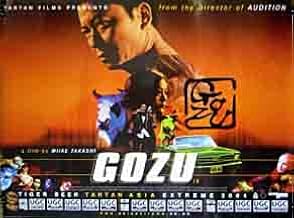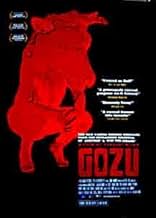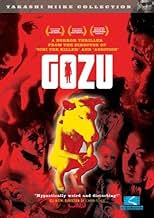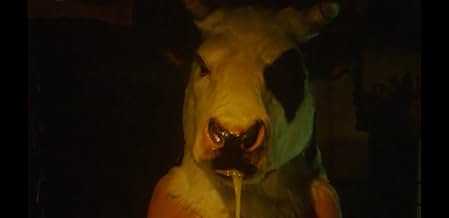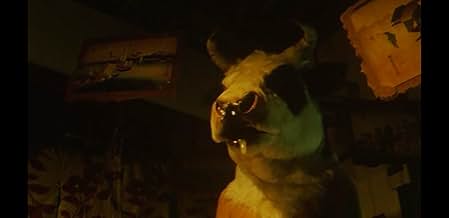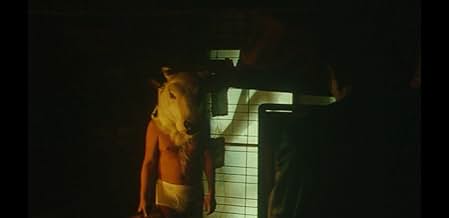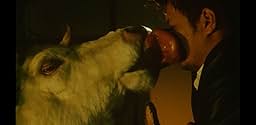AVALIAÇÃO DA IMDb
6,9/10
13 mil
SUA AVALIAÇÃO
Um executor da yakuza recebe ordens de conduzir secretamente seu amado colega para que seja assassinado. Mas quando o colega desaparece sem cerimônia no caminho, a viagem que se segue é uma ... Ler tudoUm executor da yakuza recebe ordens de conduzir secretamente seu amado colega para que seja assassinado. Mas quando o colega desaparece sem cerimônia no caminho, a viagem que se segue é uma experiência tortuosa, surreal e horripilante.Um executor da yakuza recebe ordens de conduzir secretamente seu amado colega para que seja assassinado. Mas quando o colega desaparece sem cerimônia no caminho, a viagem que se segue é uma experiência tortuosa, surreal e horripilante.
- Direção
- Roteirista
- Artistas
- Prêmios
- 5 vitórias e 4 indicações no total
Avaliações em destaque
If this is your first dive into the realm of Takashi Miike, STOP. GO BACK. REMOVE THIS MOVIE FROM YOU DVD PLAYER. You have to start somewhere less obscure than this movie. You can start out with Audition (or one of the Dead or Alive movies), follow that up with Happiness of the Katakuris and then either Ichi the Killer or Visitor Q. Once you have seen that, then you are ready to savor the flavor of this movie. To try to describe this movie would do the movie and you, the reader, an injustice. This movie just has to be watched and experienced. What can you expect from Gozu ?? Yakuzas. Killer Yakuza attack dogs. Lots of driving. Transvestites. Breast milk. Seance. Horse cropping. Sex. Birth. Ladles. The plot is based on the adventures of a yakuza made-man (Ozaki) and his underling (Minami). Ozaki is going crazy and the Boss has ordered Minami to take care of him. From there on you'll just have to watch to get the point (if there is one). As compared to his other movies, this one doesn't really have much of a story. The sheer obscureness or strangeness (and/or dark comedy) holds the various events together, linking them into a movie. At the same time, you are sitting there waiting to see how much more bizarre things can get. The movie passed by pretty quickly, with little slowdown. Fans of Miike should definitely see this movie. For everyone else, see the movie at your risk.
-Celluloid Rehab
-Celluloid Rehab
Takashi Miike's stark, "Yakuza Horror Theatre" presentation Gozu (2003) is an infernal cinematic nightmare of fear and anxiety, played out within a sepia-toned subterranean underworld abstracted to the point of outright parody. Like many of the director's more personal and idiosyncratic pictures, the plot is largely secondary to the uncomfortable atmosphere and wild sense of spectacle presented on screen, as Miike constructs an absurd and enigmatic story of a loyal Yakuza henchman struggling with issues of homosexuality, guilt and desire when he is required by his boss to "dispose" of his mentally unstable brother in arms. This incredibly personal and moral dilemma - in which the central character must juggle the greater notions of loyalty to his boss and the loyalty to his best-friend and mentor-like figure that he's obviously quite attracted to - creates a rift within the world of the film that plunges the whole story into suffocating surrealism, horror and the absurd.
As with his other great masterworks, such as Audition (1999), Birds (2000), Visitor Q (2001) and The Happiness of the Katakuris (2001), Miike takes the story in so many continually contrasting and self-consciously abstract directions as to render any notion of a single interpretation entirely void. Instead, he bombards the audience with a seemingly endless barrage of repeatedly warped visions, uncomfortable scenarios and bursts of disarming black comedy to continually shock, amuse and perturb us into a sense of ultimate submission. Eventually, the point of the film becomes less important that the sub-textual ideas behind it and the surreal and over-the-top manner in which the director depicts it - with the tone of the film switching continually from the first scene to the last, as the absurdities of the Yakuza genre that Miike knows so well are persistently ripped-to-shreds and turned into fodder for this meta-physical, psycho-sexual conundrum.
With this in mind, it is best to approach Gozu as a prolonged nightmare, complete with personal demons and elements of religious imagery interweaving, as all notions of character and conventional narrative development are done away with in favour of an almost stream of consciousness presentation where the real, the dream and the purely metaphorical are smashed together and left in shards for the audience to reinterpret as they see fit. With Gozu, more so than any of his other recent pictures, Miike takes his personal style further than even the hall-of-mirrors-like surrealism of Audition; creating a dark and distorted recreation of a nameless Japanese underworld that is labyrinthine and claustrophobic throughout, whilst simultaneously jarring us back and forth with Buddhist symbolism, bizarre caricatures and a continual hum of aural, industrialised ambiance. The whole thing is further heightened by the glowing yellow sepia tones of the cinematography, merging with the occasional shards of red and blue lighting, the lingering shadows around the edges of the frame and the often distancing and exaggerated camera angles and choices of location.
With these factors in place, it would be easy to categorise Gozu as a horror film; however, this simply isn't the case. As with many of Miike's more iconic films, Gozu follows no singular genre or style; moving freely between the characteristics of illogical comedy, knock-about buddy picture, gritty Yakuza-thriller, unrequited romance and psychological horror story seemingly simultaneously. Obviously, when we take this approach into consideration, Gozu won't be the kind of film that appeals to everyone, with a certain interest and familiarity with Miike as a filmmaker required by the audience to really appreciate the sense of humour and the continual shifts in tone. Even then, multiple viewing will be needed for the audience to fully digest the film's central message and layers of potential interpretation. However, it's definitely worth it, especially for anyone with a keen interest in the work of similarly minded filmmakers like David Lynch, Terry Gilliam, Sogo Ishii, Ken Russell, David Cronenberg and Shinya Tsukamoto.
Gozu takes the surreal horror and ambient farce of films like The Happiness of the Katakuris and Visitor Q to the next conceivable level of cinematic deconstruction, self-reference and meta-textual despair; as we literally submerge ourselves in a homosexual love story played out against a self-aware purgatory-like construction, rife with the allusions to the filmmakers aforementioned, and further applied alongside the desolate use of landscapes, jarring shifts from parody to horror and the freewheeling structure of the narrative itself. Combined with the fine performances from Hideki Sone, Kimika Yoshino, Tetsurô Tamba and Miike regulars Sho Aikawa and Renji Ishibashi, Gozu is easily one of its directors best and most unique endeavours; an arch, dead-pan, deranged and often dangerous sub-textual trawl through one man's despair and Freudian confusion dressed up as a post-apocalyptic fable of ridiculous gangster theatrics, role playing, gender metamorphosis and pure, existentialist angst.
As with his other great masterworks, such as Audition (1999), Birds (2000), Visitor Q (2001) and The Happiness of the Katakuris (2001), Miike takes the story in so many continually contrasting and self-consciously abstract directions as to render any notion of a single interpretation entirely void. Instead, he bombards the audience with a seemingly endless barrage of repeatedly warped visions, uncomfortable scenarios and bursts of disarming black comedy to continually shock, amuse and perturb us into a sense of ultimate submission. Eventually, the point of the film becomes less important that the sub-textual ideas behind it and the surreal and over-the-top manner in which the director depicts it - with the tone of the film switching continually from the first scene to the last, as the absurdities of the Yakuza genre that Miike knows so well are persistently ripped-to-shreds and turned into fodder for this meta-physical, psycho-sexual conundrum.
With this in mind, it is best to approach Gozu as a prolonged nightmare, complete with personal demons and elements of religious imagery interweaving, as all notions of character and conventional narrative development are done away with in favour of an almost stream of consciousness presentation where the real, the dream and the purely metaphorical are smashed together and left in shards for the audience to reinterpret as they see fit. With Gozu, more so than any of his other recent pictures, Miike takes his personal style further than even the hall-of-mirrors-like surrealism of Audition; creating a dark and distorted recreation of a nameless Japanese underworld that is labyrinthine and claustrophobic throughout, whilst simultaneously jarring us back and forth with Buddhist symbolism, bizarre caricatures and a continual hum of aural, industrialised ambiance. The whole thing is further heightened by the glowing yellow sepia tones of the cinematography, merging with the occasional shards of red and blue lighting, the lingering shadows around the edges of the frame and the often distancing and exaggerated camera angles and choices of location.
With these factors in place, it would be easy to categorise Gozu as a horror film; however, this simply isn't the case. As with many of Miike's more iconic films, Gozu follows no singular genre or style; moving freely between the characteristics of illogical comedy, knock-about buddy picture, gritty Yakuza-thriller, unrequited romance and psychological horror story seemingly simultaneously. Obviously, when we take this approach into consideration, Gozu won't be the kind of film that appeals to everyone, with a certain interest and familiarity with Miike as a filmmaker required by the audience to really appreciate the sense of humour and the continual shifts in tone. Even then, multiple viewing will be needed for the audience to fully digest the film's central message and layers of potential interpretation. However, it's definitely worth it, especially for anyone with a keen interest in the work of similarly minded filmmakers like David Lynch, Terry Gilliam, Sogo Ishii, Ken Russell, David Cronenberg and Shinya Tsukamoto.
Gozu takes the surreal horror and ambient farce of films like The Happiness of the Katakuris and Visitor Q to the next conceivable level of cinematic deconstruction, self-reference and meta-textual despair; as we literally submerge ourselves in a homosexual love story played out against a self-aware purgatory-like construction, rife with the allusions to the filmmakers aforementioned, and further applied alongside the desolate use of landscapes, jarring shifts from parody to horror and the freewheeling structure of the narrative itself. Combined with the fine performances from Hideki Sone, Kimika Yoshino, Tetsurô Tamba and Miike regulars Sho Aikawa and Renji Ishibashi, Gozu is easily one of its directors best and most unique endeavours; an arch, dead-pan, deranged and often dangerous sub-textual trawl through one man's despair and Freudian confusion dressed up as a post-apocalyptic fable of ridiculous gangster theatrics, role playing, gender metamorphosis and pure, existentialist angst.
Another unique outing by Takeshi Miike. Way off the wall. A yakuza soldier finds himself searching for his brother (possibly dead) in a town full of lunatics and cow-headed demons. Weird Buddhist and Freudian symbols abound. One can't help but draw comparisons to David Lynch's work -- in particular Lost Highway and Mulholland Drive. I think Miike has admitted as much himself. Highly imaginative filmmmaking. My only complaint is the pacing. It's way slow for like the first hour. I had the same problem with Audition. I can appreciate the patient construction of a creepy mood, but I think Miike could step on the gas every now and then. Still, I recommend this one. It's quite a trip. There's also a fair dose of tongue-and-cheek humor in this film. (I guess it depends on one's sense of humor.)
Dog-lovers will delight in the opening scene.
Dog-lovers will delight in the opening scene.
Basically a Japanese Yakuza Twin Peaks Lynch-like movie. Starts off slow because you have no idea where the movie is going but you slowly realise that you can appreciate it for the weird, surreal atmosphere.
Not sure what the movie is trying to say, but if someone told me it's a more fucked up, twisted version of Eyes Wide Shut in terms of undergoing some sexual odyssey, then I'll gladly believe them.
Also...that...ending...
Not sure what the movie is trying to say, but if someone told me it's a more fucked up, twisted version of Eyes Wide Shut in terms of undergoing some sexual odyssey, then I'll gladly believe them.
Also...that...ending...
The reason black comedy really isn't funny anymore is because all modern black comedies just repeat the same jokes. Though Gozu isn't going to have you laughing on your first viewing, it definitely will have you laughing in shock when you look back post-viewing, after everything comes together. Gozu isn't really hard to understand, it isn't complex, but it certainly isn't forgettable. If anything, it's set up a lot like a sick version of The Wizard of Oz: a straight path, with the lead character meeting eccentric secondary characters that help him along until he reaches the final solution to his problem. While this seems simplistic, it's impossible to not notice Takashi Miike's stunning originality throughout. While most Asian horror is riddled with cliché ghosts and evil mothers, Takashi Miike proves here that he is not only the most original Asian director out there, but one of the most original directors working in the industry today. And I think Gozu may be his masterwork.
I'm personally sick of movies that claim to be a mind trip, filled with "weird" ideas that turn out to be nothing but cliché mentions of time travel and every other genetic idea. I could list names of these filmsDonnie Darko, 12 Monkeys, etc.but the point is, weird isn't weird anymore in modern cinema. If you were been born and raised on The Twilight Zone like I was, all these movies are as generic as average spy thrillers. Gozu, however, may be one few films to come out post-2000 that I can honestly call weird. And, believe me, that is a good thing. Instead of rehashing tired clichés, Gozu brings the viewer to placed they've never even thought of before. The opening instructs the viewer not to "take anything seriouslyit's all a joke", and the punch line has to be one of the most bazaar endings in cinema history. It's terrifying and genuinely grotesque, as well as hilarious. Everything in this movie is stuff writers/directors would sit around and joke about, but never, EVER, have the balls to actually film. That's what makes the story behind Gozu so refreshing and truly original. I can't believe I'm actually writing that final line in a review.
Miike's directing is stylish, as always. He knows how to set up a scene and inflict a terrifying mood. The entire film takes itself so deadpan seriously, and though that would usually be a fatal blow to most movies, Miike makes it work here. Somehow. Whenever a major plot point happens, it's done so flawlessly it's impossible not to be immersed in the moment.
So why didn't I give Gozu a perfect score? Because as much as I loved it, the movie needed to be shortened. Do not get me wrong: I love Miike's slow dialogue as much as I love his balls-to-the-wall action, but here it gets a little overbearing. Characters sit and stare at things without any purpose, and while it works, it's just not entertaining at all. The movie could have been shortened by at least 20 minutes, and if it had been, it would have been near perfection. Also, a few scenes became very repetitious and even mildly annoying. What I mean to say is, although the story is amazing, Gozu lacks a lot of entertainment value.
Overall, though, despite its flaws, Gozu is not forgettable. It's hard for me to remember a time when I would pop in a DVD and actually remember what I watched by the next morning. In a world of cheap carbon copies plots and cheesy horror elements, Gozu seems almost like perfection, even though it really isn't. But I have no room to complain. I'd take this over another black-haired-ghost-girl-evil-mother-terrorist-time-travel movie ANY DAY.
7/10
I'm personally sick of movies that claim to be a mind trip, filled with "weird" ideas that turn out to be nothing but cliché mentions of time travel and every other genetic idea. I could list names of these filmsDonnie Darko, 12 Monkeys, etc.but the point is, weird isn't weird anymore in modern cinema. If you were been born and raised on The Twilight Zone like I was, all these movies are as generic as average spy thrillers. Gozu, however, may be one few films to come out post-2000 that I can honestly call weird. And, believe me, that is a good thing. Instead of rehashing tired clichés, Gozu brings the viewer to placed they've never even thought of before. The opening instructs the viewer not to "take anything seriouslyit's all a joke", and the punch line has to be one of the most bazaar endings in cinema history. It's terrifying and genuinely grotesque, as well as hilarious. Everything in this movie is stuff writers/directors would sit around and joke about, but never, EVER, have the balls to actually film. That's what makes the story behind Gozu so refreshing and truly original. I can't believe I'm actually writing that final line in a review.
Miike's directing is stylish, as always. He knows how to set up a scene and inflict a terrifying mood. The entire film takes itself so deadpan seriously, and though that would usually be a fatal blow to most movies, Miike makes it work here. Somehow. Whenever a major plot point happens, it's done so flawlessly it's impossible not to be immersed in the moment.
So why didn't I give Gozu a perfect score? Because as much as I loved it, the movie needed to be shortened. Do not get me wrong: I love Miike's slow dialogue as much as I love his balls-to-the-wall action, but here it gets a little overbearing. Characters sit and stare at things without any purpose, and while it works, it's just not entertaining at all. The movie could have been shortened by at least 20 minutes, and if it had been, it would have been near perfection. Also, a few scenes became very repetitious and even mildly annoying. What I mean to say is, although the story is amazing, Gozu lacks a lot of entertainment value.
Overall, though, despite its flaws, Gozu is not forgettable. It's hard for me to remember a time when I would pop in a DVD and actually remember what I watched by the next morning. In a world of cheap carbon copies plots and cheesy horror elements, Gozu seems almost like perfection, even though it really isn't. But I have no room to complain. I'd take this over another black-haired-ghost-girl-evil-mother-terrorist-time-travel movie ANY DAY.
7/10
Você sabia?
- CuriosidadesThe store-owner's American wife knew no Japanese, and had to read her lines phonetically off cue cards posted above her head. She proved to be absolutely hopeless at anything resembling proper pronunciation or competent acting. Director Takashi Miike found the result interesting and displayed the cards for a simultaneously eerie and comedic effect.
- ConexõesFeatured in Horror's Greatest: Japanese Horror (2024)
Principais escolhas
Faça login para avaliar e ver a lista de recomendações personalizadas
Detalhes
- Data de lançamento
- País de origem
- Central de atendimento oficial
- Idioma
- Também conhecido como
- Yakuza Horror Theater: Gozu
- Locações de filme
- Empresas de produção
- Consulte mais créditos da empresa na IMDbPro
Bilheteria
- Faturamento bruto nos EUA e Canadá
- US$ 58.202
- Fim de semana de estreia nos EUA e Canadá
- US$ 5.030
- 1 de ago. de 2004
- Faturamento bruto mundial
- US$ 58.633
Contribua para esta página
Sugerir uma alteração ou adicionar conteúdo ausente


